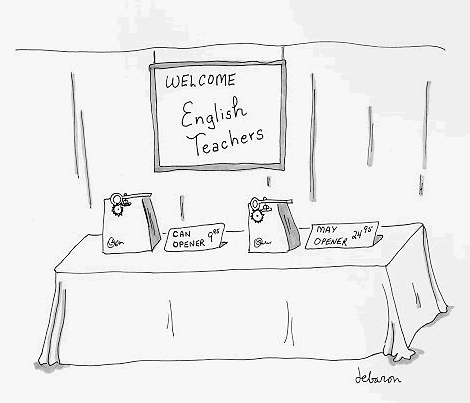March 10, 2008
To Henry Fowler on the occasion of his 150th birthday
Today is the 150th birthday of Henry Watson Fowler, author of the
influential Dictionary of Modern
English Usage. On his Web of Language blog,
Dennis Baron has created an e-card for the occasion:

In these parts, Fowler is most famous for his suggestions for
regulating the choice between the relativizers that and which, most recently treated on
Language Log by Geoff Pullum, here.
Fowler's Rule, as I've come to refer to it, is a rare instance of a
usage prescription that is motivated entirely on rational grounds -- on
the grounds that "better use might have been made of the material
to hand" than was the case in the language of the time.
Almost all the prescriptions of so-called "prescriptive grammar" began
life as PROSCRIPTIONS: someone deemed a usage to be
socially deficient in some way (non-standard, informal, spoken rather
than written, innovative, restricted to some social group or
geographical region) and proposed that this usage should be banned,
either in general (as just flat "incorrect") or at least in the formal
written standard language. This approach to usage should
therefore be properly called "proscriptive grammar". The
proscriptions are often backed up by appeals to "logic" or general
principles like avoiding ambiguity, unnecessary wordiness, unacceptable
terseness, and the like -- though sometimes the proscriptionists just
declare that some usage is wrong, period. Prescriptions come into
the matter late in the game, as offers of acceptable alternatives to
the proscribed usages.
(One bizarre consequence of this approach to usage is that the Cambridge Grammar of the English Language,
which explicitly aims to describe established formal general standard
written English -- and, in my view, does a damn good job of this -- is
nevetheless rejected by many who think of themselves as
"prescriptivists", because it fails to proscribe these critics'
favorite disapproved usages.)
Fowler's Rule, in particular the part in which Fowler suggests using that as the relativizer for
restrictive relative clauses, isn't like this at all. Both which and that were entirely standard as
restrictive relativizers in Fowler's day, as they still are.
Fowler was suggesting that that
should be used rather than which
as a matter of neatness in patterning, not because of any perceived
social deficiency (non-standardness, informality, conversational tone,
whatever) in which. The
result of following Fowler's Rule consistently (as some style sheets
now demand) is a contraction in the expressive capabilities of the
established formal general standard written language. That's why
here at Language Log Plaza we object to the enforcement of Fowler's
Rule: don't mess with our choices!
But Fowler himself was not rigid about the matter, and though there's a
lot to criticize in Modern English
Usage, we can't hold him responsible for what zealots have made
of his ideas. So let's have a glass of sherry on Fowler's 150th
birthday.